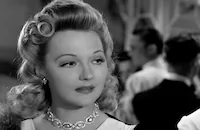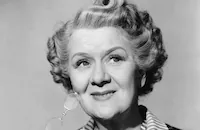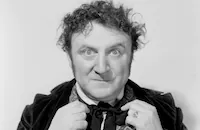Hands Across the Table

Brief Synopsis
Cast & Crew
Mitchell Leisen
Carole Lombard
Fred Macmurray
Ralph Bellamy
Astrid Allwyn
Ruth Donnelly
Film Details
Technical Specs

Synopsis
Regi Allen, a New York manicurist who was reared in poverty, is determined to marry a wealthy man. She becomes the favorite manicurist of Savoy-Carleton Hotel client Allen Macklyn, a former aviator now confined to a wheelchair because of a flying accident. Regi soon becomes the only bright spot in Allen's life, but he never tells her that he has fallen in love with her. Meanwhile, Regi meets Theodore Drew III, the nutty scion of a wealthy family that lost all their money in the 1929 stockmarket crash. Ted and Regi go out on a date and he becomes drunk, and she does not learn until later that evening that he is engaged to marry Vivian Snowden, the daughter of the "pineapple king." Unable to awaken Ted from his drunken stupor, Regi allows him to sleep on her couch that night, but finds him still there when she returns home after work the next day. Ted has missed a boat sailing for Bermuda, on which his future father-in-law had bought him a berth to keep him out of the way until the wedding. Regi allows him to stay with her, because he has no money, and they slowly fall in love, despite the fact that both are determined to marry for money. To maintain his good favor with his fiancée, Ted calls Vivian, while Regi pretends to be a Bermuda telephone operator. She interrupts so many times that she and Ted have to hang up because they are laughing so hard. When Vivian tries to get the Bermuda operator back, she finds out that the call was from New York. Finally, Ted and Regi have their last night together and, although they both admit they are in love, Regi insists that unless Ted marries for money, he will hate her within six months. After having private detectives determine the identity of Ted's girl friend, Vivian books a room at the Savoy-Carleton Hotel, and asks to see Regi. Unimpressed with her, Vivian decides to take Ted back. He, however, finally realizes how much he loves Regi when he decides he would be willing to get a job and marry her, rather than live in luxury with Vivian. Vivian releases him from their engagement, and he rushes to Allen's apartment, where Regi has just been sobbing. Allen leaves to allow Regi and Ted to talk, even though he had bought an engagement ring and was planning to propose to Regi. He is happy for her, however, and she and Ted make up and decide to marry that day. On the top of a doubledecker bus, they toss a coin to see if they will first eat lunch or marry. Ted flippantly remarks that if the coin lands on edge, he will get a job. The coin falls off the bus entirely, so they stop the bus and run through traffic to retrieve it. The coin has landed on its edge, and they kiss, oblivious to the traffic jamming up behind them.

Director

Mitchell Leisen
Cast

Carole Lombard

Fred Macmurray

Ralph Bellamy

Astrid Allwyn

Ruth Donnelly
Marie Prevost

Katherine Demille
Joseph R. Tozer

William Demarest
Edward Gargan
Ferdinand Munier
Harold Minjir
Marcelle Corday
Nell Craig
Alla Mentone
Jerry Mandy
Phil Kramer
Murray Alper
Nelson Mcdowell
Sam Ash
Albert Conti
Edward Peil Sr.
Jerry Storm
Francis Sayles
Chauncey M. Drake
S. H. Young
Rafael Gavilan
Harry Williams
Sterling Campbell
James Adamson
Fred "snowflake" Toones
Peter Allen
Ira Reed
Pat Sweeney
John Huettner
Rod Wilson

Mary Maclaren

Herman Bing
Ira Reed
Dutch Hendrian
Whitey The Cat
Crew
Edgar Anderson
Roland Anderson
Travis Banton
Alan Campbell
Sam Coslow
Viña Delmar
Hans Dreier
Henry East
Herbert Fields
A. E. Freudeman
Henry Herzbrun
Jack Kirkland
Norman Krasna
Vincent Lawrence
Harry Lindgren
Walter Oberst
Dorothy Parker
Frank Partos
William Shea
E. Lloyd Sheldon
Ted Tetzlaff
Rudd Weatherwax
Adolph Zukor

Photo Collections
Videos
Movie Clip



Hosted Intro
Film Details
Technical Specs

Articles
Hands Across the Table
Lombard plays Regi Allen, a beautiful manicurist who doesn't believe in romance, and has decided that she'll simply marry the richest man she can land. Regi soon wins the admiration of a wealthy, wheelchair-bound customer named Allen Macklyn (Ralph Bellamy). But Regi also makes a move for Theodore Drew III (Fred MacMurray), a playboy who convinces Regi he's rich by spending money on her that was given to him by his fiancée, Vivian (Astrid Allwyn). After a drunken night with Drew, Regi has to come to terms with the fact that her new marriage prospect isn't really loaded...and isn't even available for marriage. From there, it a slow re-warming process that's occasionally interrupted by heavy bouts of cynicism from both Regi and Drew.
Lombard played an active role in Hands Across the Table from the very beginning. She was even allowed to pick her own leading man, although her original choice, Cary Grant, had been temporarily loaned out to RKO and wasn't available. Later, when someone at the studio suggested MacMurray, Lombard already knew who he was because he used to play saxophone in various dance clubs around town! His chops as a comic actor, however, were far less developed. In David Chierichetti's book, Hollywood Director, Leisen speaks extensively about his approach to comedy, and Hands Across the Table in particular. "Light comedy is a state of mind," he says. "You can't really direct it, the actors just have to feel it." He says that MacMurray was too shy a performer at this point in his career to really play a scene instinctively.
Lombard, Leisen recalls, "worked as hard as I did to get that performance out of (MacMurray). She had none of what you might call 'the star temperament'. She felt that all the others had to be good or it wouldn't matter how good she was. She got right in there and pitched." At one point, Lombard even sat on MacMurray's chest, pounding on him and yelling, "Now Uncle Fred, you be funny or I'll pluck your eyebrows out!" (Given Lombard's well-known fondness for profanity, the actual quote was probably a lot more colorful than that.)
Lombard also had trouble throwing off big-screen sparks when MacMurray was involved. "The main problem with Fred in those says," Leisen said, "was that he didn't project much sex, aside from being very good looking. In the scene where he says 'Aren't you going to kiss me good-night?' Carol was supposed to walk in and kiss him, then walk out of the frame. Well, she came out past the camera, just looked at me and shrugged her shoulders, as if to say, 'So what?' Poor Fred!"
All appearances to the contrary, Lombard and MacMurray really did like each other, and credit has to be given to Leisen for managing to get that warmth into the film. He remembered shooting a scene in which Lombard pretended to be a telephone operator who constantly interrupts a call with the phrase, "Bermuda calling, Bermuda calling.": "When they finished the take, Carole and Fred collapsed on the floor in laughter; they laughed until they couldn't laugh any more. It wasn't in the script, but I made sure the cameras kept turning and I used it in the picture. It is so hard to make actors laugh naturally - I wasn't about to throw that bit out."
Happily, audiences as well as critics responded to Leisen's gift for revealing true emotion within an otherwise jokey context. In a remarkably perceptive review of Hands Across the Table which appeared in The New Republic (November 11, 1935), critic Otis Ferguson wrote that "the trouble and the danger with light comedy as a rule is that it is self-conscious over its lack of weight and either leaves reality altogether in an attempt to be capricious and unexpected about everything, or fastens on each excuse for feeling with a hollow and forced semblance of deep emotion. That Hands Across the Table keeps the delicate and hard balance between these two courses of procedure is partly the work of direction, cutting, dialogue writing; but considerably the work of Carole Lombard and Fred MacMurray."
Given how much energy she put into MacMurray's performance, Lombard could have considered that a double compliment.
Producer: E. Lloyd Sheldon
Director: Mitchell Leisen
Screenplay: Norman Krasna, Vincent Lawrence, Herbert Fields (based on the story Bracelets by Vina Delmar)
Cinematography: Ted Tetzlaff
Editing: William Shea
Costume Design: Travis Banton
Cast: Carole Lombard (Regi Allen), Fred MacMurray (Theodore Drew III), Ralph Bellamy (Allen Macklyn), Astrid Allwyn (Vivian Snowden), Ruth Donnelly (Laura), Marie Prevost (Nona), Joseph R. Tozer (Peter), William Demarest (Matty), Edward Gargan (Pinky Kelly), Ferdinand Munier (Miles), Harold Minjir (Couturier).
B&W-81m.
by Paul Tatara

Hands Across the Table
Quotes
Well, I'm not *that* unconventional.- Regi
Aw, don't be old-fashioned. What are conventions anyway? Just a bunch of salesmen sitting around and telling stories.- Ted
It was lovely of you, but taking taxis when you haven't any money is a little foolish, isn't it?- Regi
Foolish? Why, I had to take a taxi. I couldn't go out in this pouring rain and get my only suit all wet, could I?- Ted
Where's your overcoat?- Regi
Ohhh, spending a little time in the pawnshop...- Ted
Well, why did you pawn your overcoat?- Regi
Why, to pay for the taxi, of course. Dope!- Ted
We're exactly alike.- Regi
No, ha ha, oh no, your hair is much--- Ted
We are! We're both trying to do the same thing: marry for money.- Regi
Is that what you want to do?- Ted
Mm-hmm.- Regi
Oh, father's living abroad. He has an amazing ability for borrowing money from practically total strangers. Unfortunately, that ability isn't hereditary.- Ted Drew
How could the Drews be broke?- Regi
Well, do you remember that thing called the Crash?- Ted
Yes.- Regi
Well, that was us.- Ted
Yeah, and maybe here's that ten million dollars you've been dreaming about.- Laura
The way I feel today, I'd settle for a million.- Regi
You must have a lot of friends that could give you a job.- Regi
That'd be a fine friend who'd give you a job. No friend of mine had better try anything like that on me.- Ted
Trivia
Notes
The plot synopsis in the pressbook ends with the coin landing "heads up," indicating that Ted and Regi will marry first. A pre-release article in Hollywood Reporter notes that Viña Delmar originally optioned her story under the title "Hands Across the Table" to Samuel Goldwyn, who intended it as a Miriam Hopkins vehicle, however, he allowed his option to lapse. When she sold it to Paramount, she changed the name to Bracelets, the film's early working title. A Daily Variety news item notes that Gary Cooper was originally intended for the lead, however, was unable to take the part due to his commitment to Paramount's Peter Ibbetson. Modern sources frequently cite this film as Carole Lombard's first "screwball" comedy, and that it was overseen by Ernst Lubitsch, managing director of production at Paramount at the time. Hollywood Reporter production charts include Russell Hopton in the cast. Jack Kirkland was given screenplay credits in early publicity records. The cat Whitie, was owned by Henry East and trained by Rudd Weatherwax. Modern sources note that dress fittings included Edith Head; that Lombard was originally to be given sole star billing, but MacMurray was given co-star status; and that Ray Milland was originally intended for the part of Ted.















